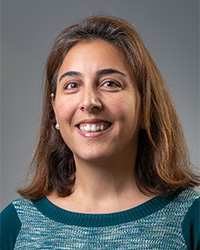Macarena Farcuh

Affiliate Faculty, Latin American and Caribbean Studies Center
Plant Science & Landscape Architecture
(301) 405-1323mfarcuh@umd.edu
2116 Plant Sciences Building - 4291 Fieldhouse Drive
Get Directions
Research Expertise
Technology, Science, and Environment
Macarena Farcuh is an Assistant Professor of Horticulture in the Department of Plant Science and Landscape Architecture. She is interested in investigating how to develop novel strategies for improving fruit quality, nutritional value, shelf-life capacity, safety and marketability throughout fruit development, harvest and postharvest storage. Macarena’s research program integrates diverse approaches, including systems biology, physiology, biochemistry, analytical chemistry, molecular biology, and sensory science. Her goal is to contribute to decrease fruit loss/waste, support environmental sustainability and, at the same time, enhance fruit consumption by meeting consumers’ expectations and thus improve the health and well-being of populations.
Macarena comes to the University of Maryland from the University of California, Davis, where she received her PhD in Horticulture and Agronomy. During her PhD she used a systems biology approach to dissect fruit quality-related pathways, with emphasis in sugar metabolism and hormone balance throughout ripening on-the-tree and postharvest storage. During her Post-Doctoral position, also at the University of California, Davis, she worked on the identification of breeding targets for texture and flavor improvement during ripening in a melon breeding program by combining sensory, physiological, biochemical and transcriptomic studies.
Macarena is originally from Chile, where she received her B.S. and her M.S degree in Agricultural Sciences from the University of Chile, with focus on Fruit Postharvest Physiology/Biology. Additionally, she has four years of experience working at the interface between academia and industry, targeting the improvement of fruit quality/nutritional value and shelf-life capacity from a cross-functional perspective. In these positions she had the opportunity to work and interact with a broad range of members of the horticultural fruit production chain in Chile, while also engaging in extension activities.

